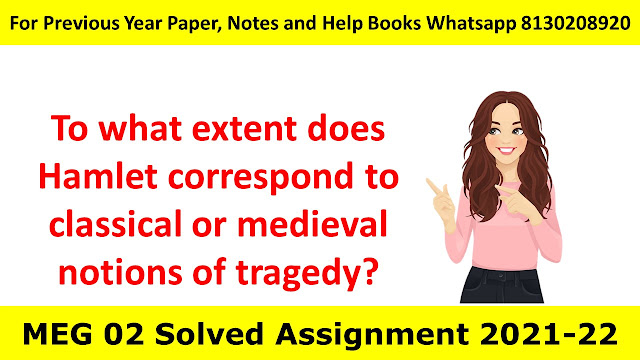To what extent does Hamlet correspond to classical or medieval
notions of tragedy?
what extent does Hamlet correspond to classical or medieval notions of tragedy Hamlet is one of the most notorious tragedies ever written, and in numerous felicitations, it exhibits the features traditionally associated with the woeful kidney. In addition to the play ending with the death of Hamlet and a host of others, Hamlet himself is a classic woeful promoter. As the Prince of Denmark, Hamlet is a figure whose conduct count to an entire area, which means the play’s events resonate through the entire world of the play. Like other woeful icons, what extent does Hamlet correspond to classical or medieval notions of tragedy he displays numerous applaudable traits. Hamlet may have a character for moping around Elsinore Castle with a melancholy disposition, but this is because he grieves his cherished father’s early death. Despite his sadness, Hamlet is an intelligent youthful man of great eventuality, as numerous other characters fete. Fortinbras says as important in the final lines of the play “ he was likely, had he been put on (the throne),/ To have proved most royal” (V.ii.373 – 74). Eventually, part of the reason Hamlet sets out down the dark path to destruction is that he succumbs to adding insulation. His insulation amplifies his inwardness, and it also has woeful goods on others. His rejection of Ophelia, combined with his murder of her father, drives her to madness and, presumably, to self-murder.
what extent does Hamlet correspond to classical or
medieval notions of tragedy
what extent does Hamlet correspond to
classical or medieval notions of tragedyFor all that it resembles a traditional
tragedy, Hamlet also strains the usual conventions of the kidney. One notable
illustration is in the “ dark path” that Hamlet embarks on that leads to
catastrophe. In utmost tragedies it’s clear that the idol is choosing to pursue
commodity they should n’t — in the case of a vengeance tragedy, the idol
succumbs to a desire for murderous revenge. In Hamlet’s case, he seems to have
every reason to take revenge, because Claudius really did murder the king and
convert his place, but Hamlet seems equivocal about the Ghost’s plea for
revenge, or slow to carry it out. He seems to want to know the verity further
than anything, which does n’t feel like a woeful choice. The choice he makes
that leads to numerous of the woeful consequences of the play — similar as the
death of Ophelia — is his choice to insulate himself from everyone differently,
bear aimlessly, and pretend to be frenetic.
what extent does Hamlet
correspond to classical or medieval notions of tragedy Another nebulosity in
Hamlet’s status as a woeful idol pertains to his woeful excrescence. what
extent does Hamlet correspond to classical or medieval notions of tragedy Compendiums frequently identify this as his
indecisiveness, which makes sense, given that Hamlet himself constantly berates
himself for being slow to take revenge. Laertes and Fortinbras function as
Hamlet’s foils in this regard; each one acts with surefooted certainty
throughout the play. Indecisiveness is a strange woeful excrescence, however,
because in utmost tragedies the excrescence helps explain why the promoter
pursues the wrong effects — the excrescence is more generally an appetite or
desire rather than a unresistant particularity. Hamlet’s indecisiveness doesn't
explain why he murders Polonius, spurns Ophelia, psychologically manipulates
Gertrude, and isolates himself from his peers. In fact, his indecisiveness is the
reason he tends to avoid taking action. what extent does Hamlet correspond to
classical or medieval notions of tragedy Read in this way, Hamlet’s
indecisiveness doesn't mark a woeful excrescence so much as an empirical
condition — a condition that moment’s cult frequently identify with
explosively.
what extent does Hamlet
correspond to classical or medieval notions of tragedyHamlet also belongs to
the kidney of vengeance tragedy in that it features a main character seeking to
retaliate a wrong against himself, but Shakespeare satirizes and modifies the
kidney in several ways. In traditional vengeance tragedies, which Shakespeare’s
followership would have been familiar with, the idol is an active, decisive
figure who mightily pursues a clear villain. The obstacles he faces are
external, and formerly he sees the occasion to take his vengeance, he seizes
it. Hamlet, on the other hand, struggles substantially with himself in his
pursuit of Claudius. His obstacles are his own vacillation and vacillation, and
he lets several openings to seize vengeance pass, similar as when he sees
Claudius soliciting and decides not to kill him. Further, Hamlet only kills
Claudius once his own death is assured, so any satisfaction he gets from his
nemesis’s death is extremely short-lived. In these ways Shakespeare provides
the traditional, bloody, action- filled vengeance tragedy with a lesser degree
of cerebral complexity and plausibility.
what extent does Hamlet
correspond to classical or medieval notions of tragedyHamlet is a tragedy that
conforms to many aspects of the Aristotelian standard. His high
stature as a tragic hero lies both in his status by birthright (he is a prince)
and in his conduct (he wants to avenge his father's death and bring honor
to the throne and his country).
what extent does Hamlet
correspond to classical or medieval notions of tragedy Hamlet is a tragedy that
conforms to many aspects of the Aristotelian standard. His high stature as a
tragic hero lies both in his status by birthright (he is a prince) and in his
conduct (he wants to avenge his father’s death and bring honor to the throne.
